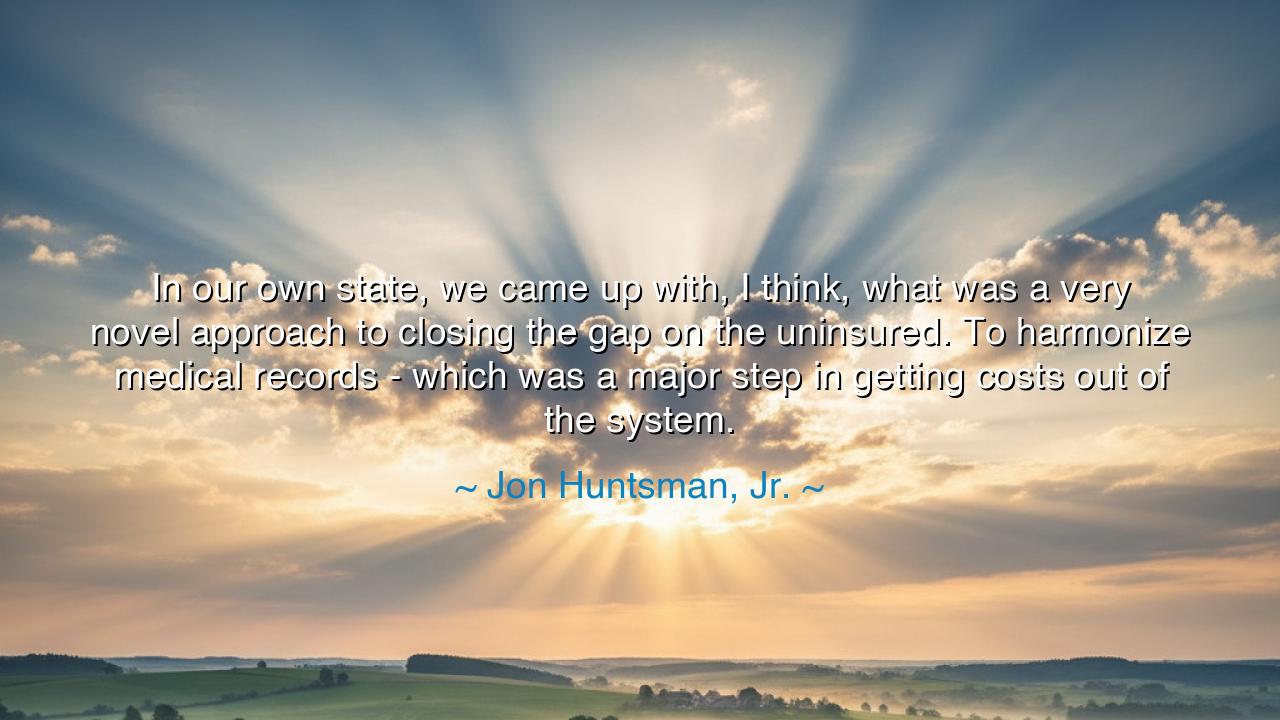
In our own state, we came up with, I think, what was a very novel
In our own state, we came up with, I think, what was a very novel approach to closing the gap on the uninsured. To harmonize medical records - which was a major step in getting costs out of the system.






Hear the voice of Jon Huntsman, Jr., who declared with vision and resolve: “In our own state, we came up with, I think, what was a very novel approach to closing the gap on the uninsured. To harmonize medical records – which was a major step in getting costs out of the system.” In this utterance we hear not the cold language of bureaucracy, but the striving of a leader to heal a wound in society—the wound of the uninsured, those who walk in the shadow of illness without protection, burdened by costs that crush the spirit.
The meaning of his words lies in their pursuit of justice through innovation. Huntsman points to the act of harmonizing medical records, a task that may seem small, yet carries the power to transform. For when records are scattered, costs multiply, errors abound, and the vulnerable are left behind. But when information is unified, when knowledge flows without hindrance, the barriers fall, and healing can reach more souls. This is not merely administration—it is compassion clothed in efficiency, a recognition that systems must serve the people, not oppress them.
The origin of this truth lies in the struggles of the American people, where healthcare has long been both blessing and burden. In his state of Utah, Huntsman sought to bridge the divide between those who could pay and those who could not, recognizing that the strength of a community lies in lifting up its weakest members. By reducing costs through the wise use of technology, he sought not only to save money, but to open doors, so that the uninsured might find refuge and care. His words spring from this effort, a practical yet moral act of governance.
History offers echoes of such vision. Consider the builders of the great aqueducts of Rome. Their work was not glamorous, yet by carrying water to every household, rich and poor alike, they gave life and health to the city. Their labor was practical, but its purpose was profound: to ensure that the blessings of civilization reached all. So too with Huntsman’s harmonization of records: it was not for glory, but for the welfare of the people, reducing waste so that resources could be directed to those who needed them most.
The emotional power of his words lies in their focus on the gap—the space between those with protection and those without, between comfort and despair. To close that gap is to affirm the dignity of every human being, to declare that no one should be cast aside for lack of means. By using innovation as a tool of mercy, Huntsman reminds us that progress is not only measured in wealth or invention, but in how those gifts are used to lift up the fallen.
The lesson for us is clear: when faced with injustice, we must look not only to ideals, but to action. Grand speeches cannot heal the sick, but wise reforms, rooted in compassion, can. If there is waste in the system, cut it; if there is inefficiency, harmonize it; if there are barriers, remove them. The path to justice often begins not with sweeping revolutions, but with steady steps of innovation and care.
Therefore, let your actions reflect this wisdom. In your communities, seek not only to dream of fairness, but to design it. Use technology with purpose, not vanity. Look for ways to reduce burdens, to widen access, to close the gaps that divide rich and poor, strong and weak. For in doing so, you honor not only progress, but humanity itself.
And so, remember the words of Jon Huntsman, Jr.: to harmonize is to heal, and to reduce cost is to increase access. This is the way of wise governance, where innovation becomes mercy, and systems become servants of the people. Walk this path, and you will build not only efficiency, but justice—a legacy that will endure beyond your days.






AAdministratorAdministrator
Welcome, honored guests. Please leave a comment, we will respond soon